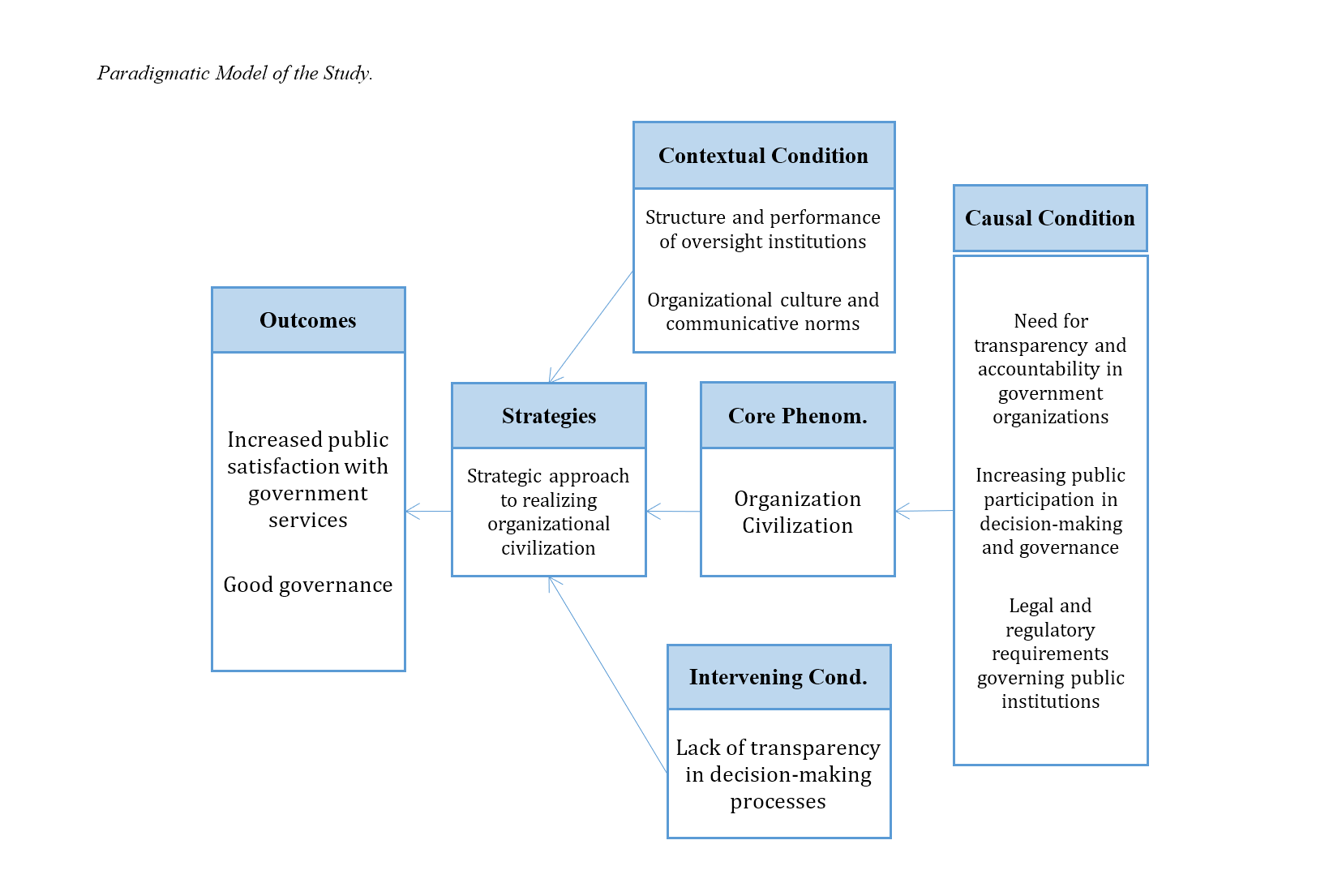Designing a Paradigmatic Model of Organizational Civilization with an Approach to Achieving Good Governance in Service-Oriented Government Organizations of Tehran
Abstract
The present study aims to design a paradigmatic model of organizational civilization with an approach to achieving good governance in service-oriented government organizations in the city of Tehran. The research methodology employed is mixed-method, incorporating both qualitative and quantitative approaches. In the qualitative section of the study, semi-structured interview questions were developed to collect data. Subsequently, the fuzzy SWARA questionnaire was used to prioritize the research indicators. The statistical population consisted of 15 experts (including professors in public and urban management from universities and managers with more than five years of experience in service-oriented government organizations in Tehran), selected through purposive sampling. In-depth and semi-structured interviews were conducted with them. The interview texts were analyzed using grounded theory through qualitative data analysis and MAXQDA software. Following this, the research indicators were prioritized using the fuzzy SWARA method. The findings indicated that causal conditions (such as the need for transparency and accountability in government organizations, increasing public participation in decision-making and governance processes, and legal and regulatory requirements governing state institutions) influence the central phenomenon (organizational civilization). The central phenomenon, contextual conditions (including the structure and performance of oversight institutions and the culture and communicative norms within organizations), and intervening conditions (such as the lack of transparency in decision-making processes) affect strategies and actions (strategic approaches toward realizing organizational civilization). Ultimately, these strategies and actions lead to outcomes (such as increased public satisfaction with government services and the realization of good governance).
References
Afshar, M., Nobakhsh, M., & Motaghi, E. (2024). Examining the role of the government and non-governmental organizations in providing health services to COVID-19 victims (Case study: Tehran). Health and Medical Management, 1, 39-54. https://www.noormags.ir/view/fa/articlepage/2182571
Alfayez, D., Hijal, I., Yoon, Y., & Sabharwal, M. (2024). Building blocks of good governance: Fostering an ethical work climate in public sector organizations. Public Administration and Development, 21(2), 339-353. https://onlinelibrary.wiley.com/doi/abs/10.1002/pad.2054
Arghan, A., Vakilian, H., & Kamyabi, S. (2024). Modeling intelligent urban management: A novel approach to good urban governance. Geographic Engineering of the Land, 8(4), 1-19. https://www.jget.ir/article_183866.html
Baradaran Khaniyan, Z., Azari, Z., & Asgharpoor, H. (2024). Investigating urban good governance indicators with an emphasis on smart city development. Geography and Development, 22(75), 193-219. https://gdij.usb.ac.ir/article_8089.html
Barati, M., Qandahari, M. T., & Mohtari, M. (2024). Identifying financial health indicators based on good governance in government organizations. Accounting and Management Perspectives, 7(89), 130-139. https://www.jamv.ir/article_198075.html
Bikasad, J. (2022). Modeling the impact of psychological climate on organizational civilization with the mediating role of human resource maturity and information literacy (Case study: National Iranian Oil Company). Promotion of Science, 13(2), 107-130. https://www.popscijournal.ir/article_168128.html
Chien, N. B., & Thanh, N. N. (2022). The impact of good governance on the people's satisfaction with public administrative services in Vietnam. Administrative Sciences, 12(1), 35. https://doi.org/10.3390/admsci12010035
Dangal, J. (2025). The Role of Good Governance in Strengthening Public Administration Nepalese Perspectives. PAAN Journal, 31, 1793-1803. https://doi.org/10.3126/paanj.v31i01.73605
Frahsa, A., Gonzalez Jaramillo, N., Ben Abdelaziz, F., Nessiem Gawrgyous, M., Anwar, Y., Abel, T., & ElFeky, S. (2023). Good urban governance for health and well-being: a systematic review of barriers, facilitators and indicators. (No Journal Title Provided). https://books.google.com/books?hl=en&lr=&id=5H0OEQAAQBAJ&oi=fnd&pg=PR4&dq=Frahsa,+A.,+et+al.+(2023).+%22Good+urban+governance+for+health+and+well-being:+a+systematic+review+of+barriers,+facilitators+and+indicators.%22+(No+Journal+Title+Provided).+%09&ots=8bkI7sopDy&sig=CY7LDHfu4mAvJCy2KT6Lm4PmDpg
Imawan, Y. N., Azzahra, N. A., Ariansyah, A. N., Siddiq, D. M., & Ramli, N. (2024). Implementation of good governance principles in the recruitment and selection process of government employees in Indonesia. International Journal of Social Service and Research, 4(6), 1-7. https://doi.org/10.46799/ijssr.v4i6.808
Karimi, H., Shirvani, A., & Valikhani, M. (2022). An analysis of the interactive relationships among factors affecting the performance development of service-oriented public management in government organizations. Strategic Management Thought, 16(2), 133-148. https://ensani.ir/fa/article/557809/
Mathobo, N., Gyimah, J., & Mathobo, R. (2024). Assessing the Effectiveness of Ethics Committees for Good Governance in the Public Sector: A Case Study of the Limpopo Province, South Africa. African Renaissance, 21(2), 339-353. https://doi.org/10.31920/2516-5305/2024/21n2a17
Mehrabi, Q., Jalali Farahani, M., & Sajadi, N. (2023). Governance model in sports federations: An approach to good governance. Sports Management, 1, 1-18. https://ensani.ir/fa/article/548154/
Namazian, H., Foroutani, Z., Baharani, A., & Gharami Pour, M. (2022). Designing and elucidating a model of organizational civilization: A case study of Isfahan Steel Company. Management of Government Organizations, 4, 35-52. https://ensani.ir/fa/article/520497/
Parmehr, T., Bahrami, S., & Jalilvand, M. (2022). The effect of organizational civilization on organizational image with the mediating role of experience documentation and organizational social network (Case study: Tehran Municipality Sports Organization). Human Resource Management in Sports, 1, 129-148. https://shm.shahroodut.ac.ir/article_2692.html
Rizky, M., Prastya, H., Ni'mah, Z., & Firmansyah, A. (2023). Sustainability Disclosure in Supporting Good Governance Practices in the Public Sector. AFEBI Accounting Review, 8(2), 102-116. http://journal.afebi.org/index.php/aar/article/view/756
Sindelo, L., & Cronje, S. (2024). Mechanisms of Ensuring Accountability: The Importance of Accountability in Promoting Good Governance in the South African Public Sector. Journal of Public Administration, 59(1), 44-52. https://doi.org/10.53973/jopa.2024.59.1.a5
Zerbian, T., & de Luis Romero, E. (2023). The role of cities in good governance for food security: lessons from Madrid's urban food strategy. Territory, Politics, Governance, 11(4), 794-812. https://doi.org/10.1080/21622671.2021.1873174

Downloads
Published
Submitted
Revised
Accepted
Issue
Section
License
Copyright (c) 2025 Elnaz Shahi (Author); Changiz Mohammadi Zadeh; Saeid Saffariyan Hamedani (Author)

This work is licensed under a Creative Commons Attribution-NonCommercial 4.0 International License.









